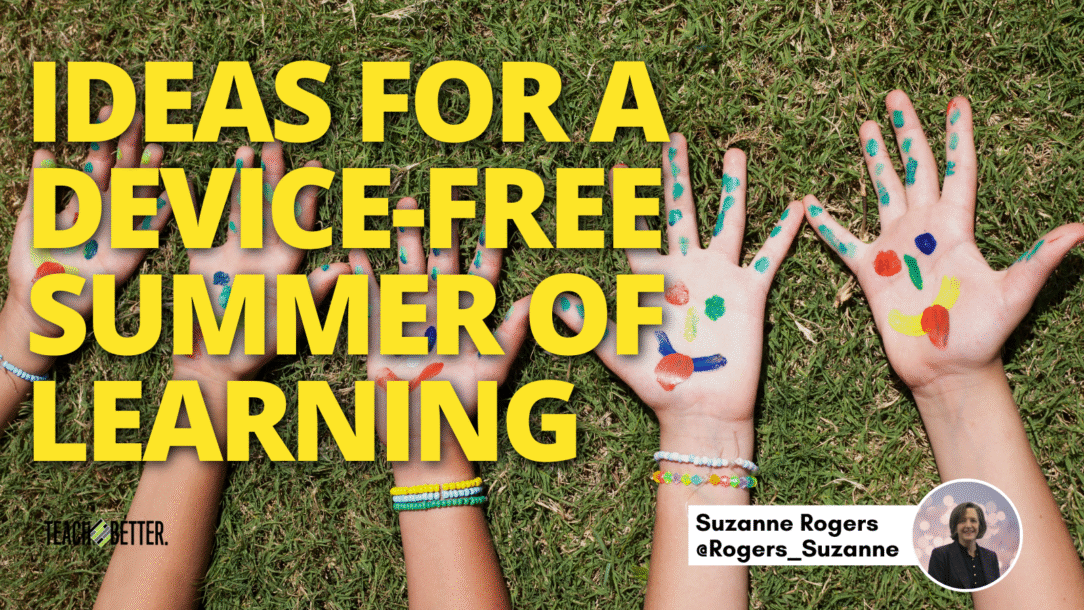A device-free summer break is often seen as a time to relax, recharge, and reconnect – but it can also be an opportunity for students to learn and grow without the glow of a screen. In a world where digital overload is real, many educators and parents seek ways to engage students in meaningful device-free learning that supports their mental health and well-being.
Most teachers believe that learning doesn’t stop when school ends, and neither should our commitment to the whole child. Here are some device-free learning ideas that are simple, and mindful, to inspire curiosity and promote balance.
🌳 1. Nature Journaling & Outdoor Exploration
Encourage students to head outdoors with a notebook and pencil. Whether they’re observing insects in their backyard or journaling from a campsite, nature journaling builds observation skills, supports scientific thinking, and promotes mindfulness.
Try This: Start with a “5 Senses Walk.” Students write down what they see, hear, smell, touch, and (if safe) taste. It’s a powerful sensory exercise that reconnects them to their environment. Looking for more? Try this resource from the Baltimore Woods Nature Center.
📚 2. Create a Summer Reading Adventure
Reading remains one of the best ways to grow vocabulary, imagination, and empathy. Offer students a summer reading challenge that includes books across genres, and encourage journaling or drawing about what they read.
Tip: Suggest a mix of fiction, nonfiction, poetry, and graphic novels—let students lead with their interests. Bonus points for books read outside under a tree! Students can also join the NationalBook.org Summer Reading Adventure!
[scroll down to keep reading]
🧠 3. Mindful Movement & Meditation
Incorporating mindful practices into summer routines helps reduce stress and build emotional awareness. Yoga, stretching, walking meditations, or even simple breathing exercises can be powerful tools.
Student Challenge: Start or end the day with 5 minutes of quiet breathing or stretching. Reflect on how it makes them feel afterward in a journal.
🍳 4. Learning Through Life Skills
Summer is the perfect time to teach life skills that don’t always fit into the academic calendar. Cooking, budgeting, gardening, and even organizing their room can be framed as learning experiences. YouTube is great, but try device-free learning from a family member instead!
Bonus: These activities build executive functioning and promote independence, which supports both academic and social-emotional success.
✉️ 5. Handwritten Letters to Family or Pen Pals
Writing real letters helps students practice writing, storytelling, and empathy, all without a screen. Whether it’s a thank-you note, a letter to a grandparent, or starting a pen pal exchange, the personal connection is powerful. Enhance your writing skills and impress your grandmothers by going device-free!
Pro Tip: Turn it into an art project by making envelopes from recycled materials or decorating the paper.
🧩 6. Puzzle Challenges & Strategy Games
Board games, card games, and puzzles are great for building logic, cooperation, and critical thinking. Invite students to design their games or puzzles for the family to play.
Tip: Have students write the rules and instructions. It’s a great real-world writing task.
🧺 7. Weekly “Digital Detox” Days
Empower students to choose a full day each week to go screen-free. Encourage families to participate by planning shared activities like hiking, picnicking, or crafting.
Mental Health Connection: Regular breaks from screens can reduce anxiety, improve sleep, and foster deeper connections.
“Almost every great truth that we get from the ancients about how to live a better life, to become a better person, ‘judge not lest ye be judged’; ‘be slow to anger, be quick to forgive’ the online life, the social media life, the phone-based life, tells us to do the opposite.”
These are the words of Jonathan Haidt, a professor of ethical leadership at New York University and author of The Anxious Generation: How the Great Rewiring of Childhood Is Causing an Epidemic of Mental Illness. Dr. Haidt has built the phone-free schools movement! The entire state of Arkansas will be phone-free from bell to bell!
Why It Matters
Summer learning doesn’t need to be digital to be dynamic. By encouraging students to step away from their screens, we’re giving them space to be curious, creative, and calm. These device-free learning experiences help students enter the next school year with renewed focus and a healthier relationship with technology.
Most teachers believe in a whole-child approach, and that includes making room for device-free joy, rest, and reflection.
Here are a couple more Teach Better posts to look to for ideas:
About Suzanne Rogers
Suzanne M. Rogers is an accomplished, passionate, technology-inspired educator, experienced conference presenter, and yoga enthusiast. She is the Assistant Director of Public Relations at LISA Academy Public Charter Schools. In addition to her 20 years of work in education, Suzanne also serves on the Arkansas Museum of Fine Arts Educator Advisory Board, the UCA Executive Advisory Board, the UCA MAT Program Advisory Board, and the SAU ERZ Advisory.
Suzanne’s passion for education and her community is evident in her involvement in these organizations, where she works tirelessly to support students and educators. As an #ArmyMom and former #AFbrat, Suzanne brings a unique perspective to her work, understanding firsthand the sacrifices made by military families. Suzanne exemplifies dedication, expertise, and commitment to excellence.



